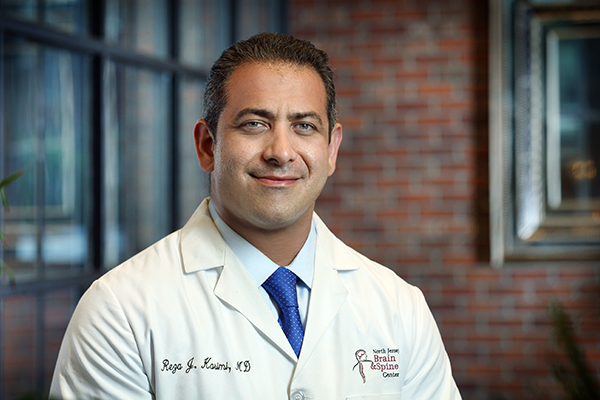
November 23, 2020
Michele Blum’s Story
Michele Blum is an actress who lives to be on the stage. But when multiple aneurysms left her in a...

I want my patients to know that if they have a condition that requires surgery, I’m going to get them through it as safely as possible, using the most minimally invasive techniques available.
Dr. Karimi is one of only a few neurosurgeons in the country with advanced fellowship training in open microvascular neurosurgery and endovascular neurosurgery. This subspecialized training enables him to successfully perform some of the most highly complex and intricate surgical procedures, including using the latest techniques to treat brain aneurysms, vascular tumors, stroke, and vascular malformations of the brain and spine.
A lifelong New Jersey resident, Dr. Karimi has a single goal when treating patients: Avoid surgery whenever possible, and if surgery is necessary, provide the safest, most effective approach. To ensure he meets that goal, he views patients like family and he treats them like family, never recommending treatment that he would not recommend to his own relatives.
Dr. Karimi is dedicated to advancing neurosurgical knowledge among his colleagues and physicians in training. An assistant professor in the Department of Neurosurgery at Seton Hall-Hackensack Meridien School of Medicine, he has also authored several peer-reviewed articles and textbook chapters in major neurosurgical textbooks. Dr Karimi is an instructor for the American Association of Neurological Surgery (AANS) Goodman Board certification course, and regularly trains neurosurgery residents and fellows in the latest surgical techniques.
He has conducted clinical research in the fields of cerebrovascular neurosurgery, endovascular neurosurgery, neurocritical care, neurosurgical anatomy, flow dynamics of intracranial aneurysms, and biomechanics of the spine.
Cerebral Venous Thrombosis in COVID-19: A New York Metropolitan Cohort Study, American Journal of Neuroradiology. April 2021.
BACKGROUND AND PURPOSE: Severe Acute Respiratory Syndrome coronavirus 2 (SARS-CoV-2) infection is associated with hypercoagulability. We sought to evaluate the demographic and clinical characteristics of cerebral venous thrombosis among patients hospitalized for coronavirus disease 2019 (COVID-19) at 6 tertiary care centers in the New York City metropolitan area.